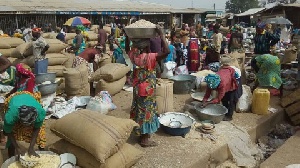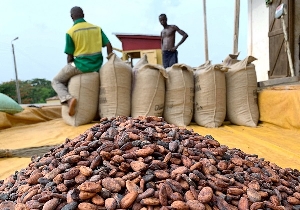- Home - News
- TWI News | TV
- Polls
- Cartoons
- Year In Review
- News Archive
- Crime & Punishment
- Politics
- Regional
- Editorial
- Health
- Ghanaians Abroad
- Tabloid
- Africa
- Religion
- Election 2020
- Coronavirus
- News Videos | TV
- Photo Archives
- News Headlines
- Press Release
- News Blogs
Business News of Thursday, 15 August 2024
Source: classfmonline.com
Ghana's food insecurity crisis worsens amid economic struggles - Report
Ghana is facing an escalating food insecurity crisis, with the rate of insufficient food consumption rising by 5.77 per cent in July 2024.
This is according to the latest Food Security Monitor report.
This significant increase is largely attributed to the ongoing cost-of-living crisis, which has been exacerbated by persistently high inflation, a weakening currency, and soaring fuel prices.
These economic pressures have driven up the cost of essential commodities, particularly staple foods such as maize and rice.
This concerning development aligns with projections from the World Food Programme, which warned in its February 2024 report and subsequent March analysis that approximately 1.05 million Ghanaians would face food insecurity between June and August 2024.
The WFP identified multiple contributing factors, including climate change, low agricultural prices, inadequate infrastructure, and limited access to education.
Ghana’s heavy reliance on imported rice has further heightened its vulnerability to global market fluctuations.
The July report also noted that while IFC rates remained stable in most countries from June to July, Ghana, Nigeria, and Uganda saw notable increases of 5.77 per cent, 3.98 per cent, and 7.5 per cent respectively.
Conversely, Zimbabwe experienced a 5.45 per cent decrease in IFC during the same period.
On a year-over-year basis, the majority of countries have seen increases in IFC, with exceptions including Mozambique, Rwanda, South Sudan, Uganda, and Zambia, where current levels are lower than those recorded a year ago.
The report also identifies several nations as food insecurity hotspots, where over half of the population faces insufficient food consumption.
These include Burkina Faso (56.6 per cent), Mali (69.1 per cent), Niger (82.6 per cent), and Nigeria (51.5 per cent).











